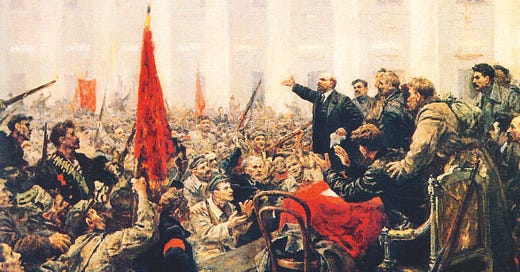Introduction to The Proletarian Revolution: Babeuf to Marx
The dictatorship of the proletariat alone can emancipate humanity from the oppression of capital, from the lies, falsehood and hypocrisy of bourgeois democracy—democracy for the rich—and establish democracy for the poor, that is, make the blessings of democracy really accessible to the workers and poor peasants, whereas now (even in the most democratic—bourgeois—republic) the blessings of democracy are, in fact, inaccessible to the vast majority of working people.
Lenin, The Proletarian Revolution and the Renegade Kautsky
The central theme of my book (serialized via Substack) is the theory of proletarian revolution.
In the bourgeois revolution, as a critique and an endeavor to surpass its political cloak—viz., its horizon—the first ideas of the proletarian revolution emerge during the French Revolution and the subsequent radical movements. These ideas, perspectives, and their controversies—i.e., their historical significance—are presented in this book through the exposition and critique of the political ideas of the Babouvists and the political thought of Blanqui. This analysis aims to reveal the rudimentary ideas, perspectives, and forms of class struggle of the proletariat in the process of its historical emergence and revolutionary constitution. In this historical context, the anarchist understanding of social revolution also arises. In the essay on Proudhon’s political doctrine, that is, in the consideration of the concept of revolution that remains within the realms of the bourgeois world, this theoretico-practical orientation is both displayed and examined.
This is the content of the first part of the book, which highlights the aporias of the proletarian revolution.
In the second part of the book, Marx’s understanding of the proletarian, or communist, revolution as a historical act of the working class is presented; a process of universal human emancipation that begins with the critique of the bourgeois revolution and its achievements, and through a critique of the totality of life in capitalist society, lays the foundation for the revolutionary process of constructing a communist society. Hence, the second part of the book explores the concept of revolution, the critique of bourgeois society and the political state, the analysis of the political forms of revolutionary transformation, and the problem of the proletariat’s party in Marx’s work.
The exposition of Marx’s investigation into the communist revolution and the critique of ideas and theories about the proletarian revolution that have emerged from the French Revolution to Marx’s time and beyond—which is the subject of discussion in this book—was, for me, a quest for methodological and theoretical footholds in researching the currents and realities of the revolutionary transformation of the bourgeois world.



